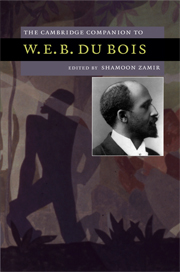Book contents
- Frontmatter
- Introduction
- 1 The Souls of Black Folk: Thought and Afterthought
- 2 “Of the Coming of John”
- 3 The Fiction of W. E. B. Du Bois
- 4 Du Bois and the “New Negro”
- 5 Du Bois, Black Leadership, and Civil Rights
- 6 Du Bois, Race, and Diversity
- 7 Du Bois on Race: Economic and Cultural Perspectives
- 8 Africa and Pan-Africanism in the Thought of Du Bois
- 9 The Place of W. E. B. Du Bois in American and European Intellectual History
- 10 Race, Marxism, and Colonial Experience: Du Bois and Fanon
- Further Reading
- Index
1 - The Souls of Black Folk: Thought and Afterthought
Published online by Cambridge University Press: 28 November 2008
- Frontmatter
- Introduction
- 1 The Souls of Black Folk: Thought and Afterthought
- 2 “Of the Coming of John”
- 3 The Fiction of W. E. B. Du Bois
- 4 Du Bois and the “New Negro”
- 5 Du Bois, Black Leadership, and Civil Rights
- 6 Du Bois, Race, and Diversity
- 7 Du Bois on Race: Economic and Cultural Perspectives
- 8 Africa and Pan-Africanism in the Thought of Du Bois
- 9 The Place of W. E. B. Du Bois in American and European Intellectual History
- 10 Race, Marxism, and Colonial Experience: Du Bois and Fanon
- Further Reading
- Index
Summary
... a combination of social problems is far more than a matter of mere addition; - the combination itself is a problem.
W. E. B. Du Bois, The Philadelphia Negro (1899)The subtitle of The Souls of Black Folk is “Essays and Sketches.” Together, the title and subtitle indicate a collection which offers the reader variations upon a theme. The fourteen chapters which comprise the main body of the book were written between 1897 and 1903. Nine had been published previously in various journals and magazines before being revised for inclusion in Souls. Taken together, the fourteen chapters range across social, political, and economic history, religion and education, psychology, the sociology of music, autobiography, and fiction. But Souls is more than simply a collection of essays and fiction held loosely together by a focus on the broad common ground of African American historical experience and contemporary life. It is a “combination” but one which is more than “mere addition.” In bringing together the disparate pieces, in revising the already published ones, and in ordering and framing them in particular ways, Du Bois transfigured them, so that Souls became a literary work which is greater than the sum of its parts.
In its opening lines Souls announces the problem which is its first subject: “the color-line” as a border which, in its very divisiveness, is constitutive of modernity. The present essay argues that the book's literary achievement lies above all in creating a form in which understanding can only grasp the scope and nature of the problem of race and modernity, its confounding knottiness, by passing through its own undoing and leaving behind the established academic and journalistic conventions of social analysis.
- Type
- Chapter
- Information
- The Cambridge Companion to W. E. B. Du Bois , pp. 7 - 36Publisher: Cambridge University PressPrint publication year: 2008
- 1
- Cited by



